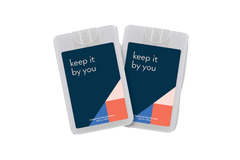Tech Without Stress, which gives parents of 10- to 17-year-olds a playbook for parenting around smartphones and social media (follow along @techwithoutstress!). Her book is Behind Their Screens: What Teens are Facing (and Adults are Missing), co-authored with her longtime colleague Dr. Carrie James. We’ve asked Emily to shed some light on the topic to bring you a Teens & Tech 101 overview. First of all, congrats on your NEW BOOK! Let's jump right in...
First of all, congrats on your NEW BOOK! Let's jump right in...
High level, what is your thesis on teens and technology?
Think of social media like an amplifier. But the essential question is: what is it amplifying for a particular person? Teens have different strengths and vulnerabilities, and they’re not all impacted by screen time in the same way. This is partly because they’re not all doing the same things on their screens. Content really matters: an hour of browsing videos on how to nail a skateboard trick just isn’t the same as an hour browsing content that encourages disordered eating. They’re also impacted in different ways because of their interpretations. One teen might look at someone’s highlight reel and feel really bad about their own life, while another might look at the same posts and feel inspired.
I get that we all want simple answers and magical screen time limits or rules that will protect everyone. But the truth is that if we really want to help, we need to tune into the details of what’s hard for different teens about growing up with tech. Body image issues, sleep disruption, drama, insecurity, performative activism, gaming issues – these aren’t all the same in terms of the problem or how we address it.
Your book Behind Their Screens: What Teens are Facing (and Adults are Missing) feels like it should be required reading for us parents who are preparing to (or currently are) raising adolescents in the twenty first century. Please tell me how this book will it save me as a mom raising two boys in the digital age 🙏🏼
We’ve been studying teens and screens for over a decade. We recently had the chance to do a study with more than 3,500 teenagers about how they navigate the digital world. Honestly, so much of what we heard surprised us– even though we’ve spent years talking to teens about these issues. We wrote the book to share the stories and insights that really stopped us in our tracks, and to help other adults understand what we’ve all been missing. The book breaks down for you what’s myth, what’s reality, and how to have better conversations about tech with the teens in your life.
There are lots of opinions out there on the evils of social media and children even having devices in general. What do you think of the "Wait ‘til 8th" campaign for parents to wait until their children are in 8th grade before getting a smartphone?
It’s easier for kids to delay the first phone if their friends are doing so too. If you can, work on getting buy-in from other parents in your child’s friend group so you’re all in it together. This way, your kid isn’t the only one without a phone. Plus, you’ll be able to have a team approach to saying, “not yet!” rather than feeling like the lone holdout. (Tip: You may also want to discuss your collective stance on Watches as part of this.)
What do you say to the parent who says social media is not allowed in their house?
Again and again, our research has demonstrated the importance of getting curious about people’s experiences before rushing to judgment. I believe we all have the same big goal, which is to raise well-adjusted kids. Social media can be a tremendous resource, but also a minefield. For some kids, there are honestly more downsides to being cut off than to being on social media. For others, the opposite is true. Typically, I tell parents who prohibit social media two things:
- Beware of driving risky behavior underground. If kids know their parents don’t allow it and they’re set on finding a way to use social media, they can end up with hidden accounts but without guidance or supervision. Then, it’s like we’ve added a hurdle to having them come to us for help when something goes wrong, because they’re going to have to admit they’ve been breaking our rules.
- Know that keeping them off of social media won’t spare them of all digital drama. Tweens and teens tell us about drama that plays out in group text chats, in gaming contexts, and even in comment threads on Google Docs.
Is there any value in social media for teens?
Yes, and the best way to learn about the upsides for your teen is honestly just to ask. We so often get stuck in our assumptions that it’s all bad or a waste of time that we forget to try and see the positives through their eyes. Some of the benefits we’ve studied include exploring interests, expressing yourself, feeling supported and connected to others, feeling seen or understood, unwinding to relax, and empowering civic engagement.
What are one or two tips you have for how we as parents should protect our children when it comes to social media?
Pay attention to what you’re modeling in your own tech habits. There’s honestly no magic wand that will undo the impacts of what kids see us do day in and day out. Model for kids good, focused attention. It’s powerful to normalize the ways we can all feel pulled to our device and the steps we can take when it happens. This might mean saying something as simple as, “I’m feeling so distracted by phone today! I’m going to put it in the other room so I can pay attention to what you’re saying.”
What about talking with our kids about social media? What is your #1 tip there?
Focus less on the tech and more on the feelings. This helps us lean into empathy and validation, which are key to better conversations – and connections – with our kids. Sure, Snapchat streaks might seem dumb to you, and you may think it’s ridiculous to panic because a friend’s loving comment on your post isn’t quite as enthusiastic as her comment on another friend’s post. But maybe you can tap back into how it felt as an adolescent to want to feel close to your friends. Maybe you can remember wanting to protect your most cherished relationships, and to solidify your place in the social landscape. Looking beyond the tech itself helps us recognize points of connection and tap authentic empathy. This is gold!
Any apps we should specifically look out for?
BeReal has recently become more of a focus. It’s an app that sends you a push notification at a particular time of day to “BeReal” and take a picture. You have two minutes to capture a shot and share it with your friends on the app; then, it’s viewable to others for 24 hours. We’ve been hearing from some teens that this is a new favorite because it encourages fun, less pressured sharing; for others, it’s generating pressures or even unwanted realizations (like: ‘wow, it seems like everyone is always socializing and I’m always alone when I get the ping to post’).
How can we continue to stay up to date on the latest digital trends and danger zones for our kids? What are the best resources we can use (beyond your book, of course!)
Carrie and my research team has worked with Common Sense Media for a long time, and we’re big fans of their resources.
Any last words of wisdom (or consolation)?
Even as we studied thousands of teens’ worries and pain points around tech, we came away from our research really hopeful. It was clear that while the struggles are real, teens are motivated to have happy, healthy relationships with tech. Also: they actually want to talk about the ups and downs of tech. The problem is that adults’ messages too often miss the mark because we misunderstand what they’re up against. When we lean into the details and get curious about their experiences, we’re in a much better position to offer the help and guidance they need.
And before we go, a couple more questions about YOU!
You taught Harvard’s very first course on “Adolescents and Social Media” and you just finished teaching another course there on “Digital Dilemmas.”
What was the path that led you here?
People in my field sometimes joke that research is actually me-search, and researchers are ultimately just trying to understand our own lives and struggles. In my case: Why is it so easy to fall back into a routine of browsing my phone in bed? Why am I so tempted to look at my notifications during dinner? Even knowing the science hasn’t solved my tech issues… and I have the benefit of an adult brain.
Because my background is in adolescent psychology, I know that emotions are amplified for teens. Peer feedback is especially motivating and high stakes during the adolescent years, and social exclusion actually hurts more – at a basic, neural level – compared to other phases of life. Enter: technologies that give teens unprecedented access to new kinds of social information to analyze and worry about. I just can’t stop thinking about it all, and this curiosity has motivated my career.
And why are these courses essential to the Graduate School of Education?
The dynamics of tech are colliding with child development in ways that have major implications for their lives and learning. There are also essential implications for actual curricula, since we all want to figure out how to equip students with the skills and dispositions they need to be happy, healthy, engaged citizens of this radically digital world.
About Emily:
Emily holds a Doctorate from Harvard University in Human Development and Education, a Masters from Harvard in Prevention Science and Practice, and a Bachelors from Cornell. She’s currently a Principal Investigator at Project Zero, which is a 50+ year old research center at the Harvard Graduate School of Education. She is also a lecturer at Harvard Graduate School of Education.
Emily lives with her family in CT and loves to put her (low-key) culinary degree to practice, cooking as often as she finds time for.
You can purchase Emily's book online here: Behind Their Screens: What Teens are Facing (and Adults are Missing)
To learn more, you can visit the book's website here: www.behindtheirscreens.com




Leave a comment